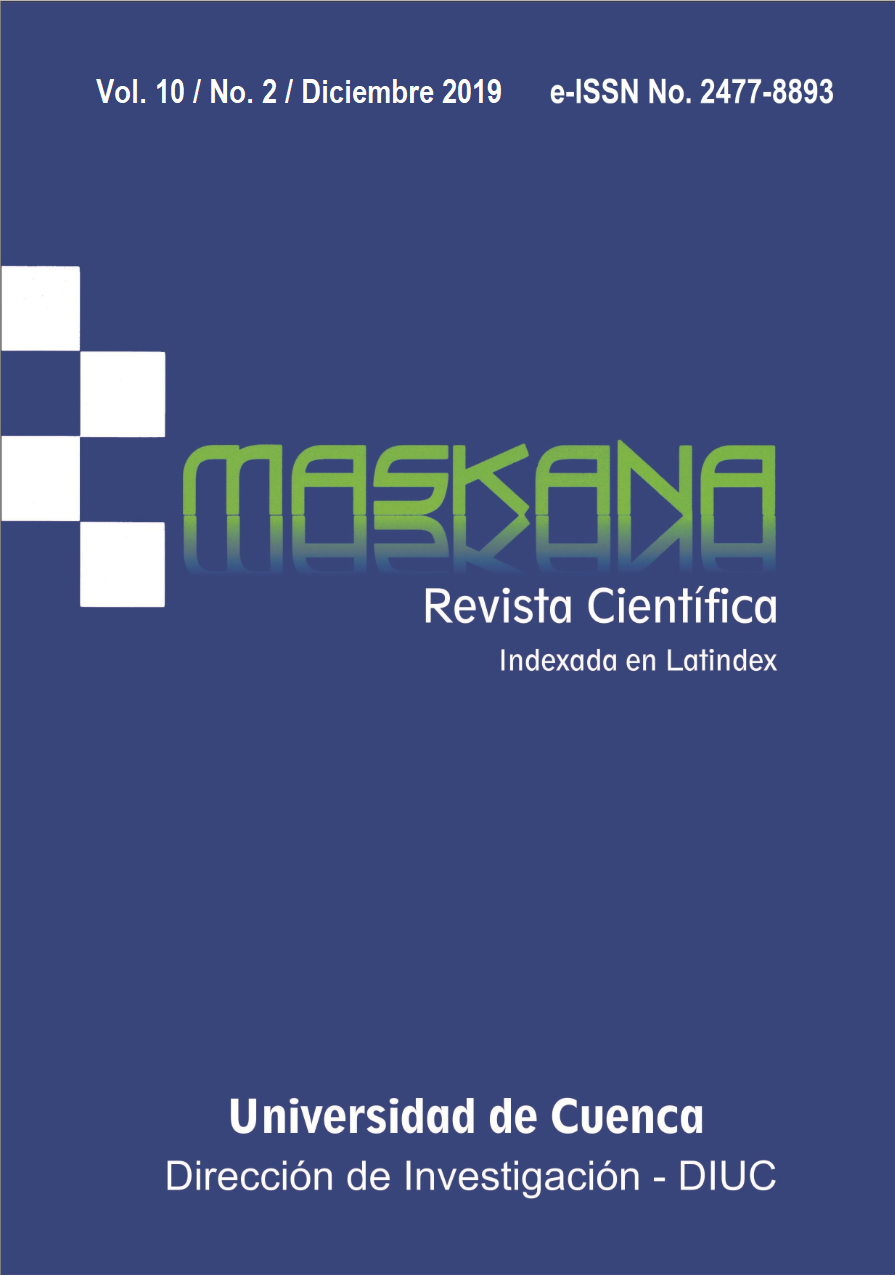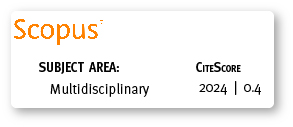Una LLAMADA DE ATENCIÓN para las universidades ecuatorianas
DOI:
https://doi.org/10.18537/mskn.10.02.01Palabras clave:
ranking universitario, desafíos del siglo XXI, reingeniería de IES, gobernanza compartida, naturaleza multidisciplinaria de los problemas, cooperación entre facultades y universidadesResumen
Una llamada de atención es una alerta sobre una situación insatisfactoria que impulsa a las personas a remediarla. En este sentido, la reciente publicación del QS World University Rankings 2020 puede verse como una llamada de atención para las universidades de Ecuador, SENESCYT, CACES y CES. En primer lugar, el presente trabajo evalúa el desempeño de las universidades ecuatorianas utilizando el método QS World University Rankings 2020. El análisis revela que el grupo de universidades ecuatorianas con mejor desempeño es extremadamente pequeño y, además, la mayoría de las instituciones incluidas en el ranking vieron bajar su posición con respecto al año 2019. Para el período 2009-2019 también se analizó el registro de publicaciones en SCOPUS de las 11 universidades ecuatorianas mejor calificadas. En dicho período el número promedio anual de artículos publicados aumentó drásticamente, de 22.2 a 192 (873%); sin embargo, algunas instituciones perdieron posiciones en el ranking a pesar de un aumento en su registro anual de publicaciones. La segunda sección del manuscrito describe lo que las universidades ecuatorianas deberían hacer para mejorar su desempeño y contribución al progreso de la sociedad. Según el autor, las universidades deben invertir urgentemente en calidad, aprovechar el potencial de los métodos de aprendizaje modernos, hacer de la investigación un componente maduro y de vinculación con la sociedad, estimular la colaboración inter e intrainstitucional en todos los niveles y convertir la escisión (spin-off) en centros de innovación. Hacerlo requiere no solo un cambio de actitud de toda la comunidad académica -autoridades, profesores, investigadores, personal administrativo y técnico-, sino también, y más importante, de las instancias gubernamentales a cargo de la educación superior. Las IES públicas deben ser rediseñadas de manera directa para convertirlas en instituciones capaces de ofrecer a los graduados los conocimientos y las habilidades necesarias para enfrentar los desafíos presentes y futuros, a la vez que garanticen un crecimiento económico sostenible y en armonía con el medio ambiente. La tercera sección de este artículo describe los pilares institucionales que requieren renovación. Para que la reingeniería de la universidad sea un proyecto factible, es esencial que los tomadores de decisiones abran sus mentes y se den cuenta de que las universidades en el siglo XXI requieren cambios sustanciales de gobernanza. Además, las narices de todo el personal deben girar hacia la misma dirección, lo cual significa una intensa cooperación, en la que cualquier rastro de corrupción, colusión o nepotismo, sea eliminado.
Descargas
Métricas
Citas
Bryde, D., & Leighton, D. (2009). Improving HEI productivity and performance through project management. Educational Management Administration & Leadership, 37(5), 705-721. https://doi.org/10.1177/1741143209339649
Burke, J. C. (2002). Funding public colleges and universities for performance. Birmingham, Alabama, USA: Rockefeller Institute Press.
Cardoso, S., Tavares, O., & Sin, C. (2015). The quality of teaching staff: higher education institutions’ compliance with the European Standards and Guidelines for Quality Assurance – the case of Portugal. Educational Assessment, Evaluation and Accountability, 27, 205-222. https://doi.org/10.1007/s11092-015-9211-z
Connor, A. M., Karmokar, S., & Whittington, C. (2015). From STEM to STEAM: Strategies for enhancing engineering & technology education. International Journal of Engineering Pedagogy, 5(2), 37-47. http://dx.doi.org/10.3991/ijep.v5i2.4458
de Boer, H., Jongbloed, B., Benneworth, P., Cremonini, L., Kolster, R., Kottmann, A., Lemmens-Krug, K., & Vossensteyn, H. (2015). Performance-based funding and performance agreements in fourteen higher education systems. Report for the Ministry of Education, Culture and Science, 164 pp. Center for Higher Education Policy Studies, Universiteit of Twente, Enschede, The Netherlands.
Dumciuviene, D. (2015). The impact of education policy to country economic development. Procedia – Social and Behaviorial Sciences, 191, 2477-2436. https://doi.org/10.1016/j.sbspro.2015.04.302
El Mercurio (2019). Ecuador está 20 años por detrás de su entorno en innovación científica. Disponible en https://ww2.elmercurio.com.ec/2019/05/27/ecuador-esta-20-anos-por-detras-de-su-entorno-en-innovacion-cientifica/
European Commission (2014). Performance agreements and their relationship to funding in higher education. The Hague, The Netherlands: ET2020 country workshop.
Hauptfeld-Göllner, P. (2016). Five ways the lecture halls of 2030 will be different. The 28th Conference of the European Association for International Educators (EAIE). Liverpool, UK. Available at https://www.timeshighereducation.com/news/european-association-for-international-education-eaie-conference-2016-five-ways-the-lecture-halls-of-2030-will-be-different
Heitor, M., & Horta, H. (2016). Reforming higher education in Portugal in times of uncertainty: The importance of illities, as non-functional requirements. Technological Forecasting and Social Change, 113(Part B), 146-156. https://doi.org/j.techfore.2015.09.027
Herbst, M. (2007). Financing public universities: the case of performance funding. Dordrecht, The Netherlands: Springer.
Jiju, A., Krishan, N., Cullen, D., & Kumar, M. (2012). Lean Six Sigma for higher education institutions (HEIs). Challenges, barriers, success factors, tools/techniques. International Journal of Productivity and Performance Management, 61(8), 940-948. https://doi.org/10.1108/1741040121177165
Król, A. I., & Dziechciarz-Duda, M. (2013). On the non-monetary benefits of tertiary education. Ekonometria, 41, 78-94.
Leach, A. (2015). 15 steps closer to quality higher education in Africa. The Guardian. Available at https://www.theguardian.com/global-development-professionals-network/2015/aug/10/15-steps-closer-to-quality-higher-education-in-africa
Madden, M. E., Baxter, M., Beauchamp, H., Bouchard, K., Habermas, D., …, et al. 2013. Rethinking STEM education: An interdisciplinary STEAM curriculum. Procedia Computer Science, 20, 541-546. https://doi.org/10.1016/j.procs.2013.09.316
O’Brien, J. (2008). Are we preparing young people for 21st century citizenship with 20th century thinking? Contemporary Issues in Technology and Teacher Education. [Online serial], 8(2), Retrieved from https://www.citejournal.org/volume-8/issue-2-08/social-studies/are-we-preparing-young-people-for-21st-century-citizenship-with-20th-century-thinking-a-case-for-a-virtual-laboratory-of-democracy
Özsoy, C. E. (2008). The contribution of higher education to economic development. In: Ciampi, F., & Gupta, A. (Eds.). Proceedings of the 8th Global Conference on Business & Economics, 1354 pp. Lynchburg, Virginia, USA.
Prakash, G. (2018). Quality in higher education institutions: insights from the literature. The TQM Journal, 30(6), 732-748. https://doi.org/10.1108/TQM-04-2017-0043
QS World University Ranking (2020). The top 200 universities in Latin America. 64 pág. Disponible en https://www.topuniversities.com/universities/country/ecuador
QS World University Ranking (2020). Who rules? The world’s top universities in 2020. 56 pág. Disponible en https://www.topuniversities.com/university-rankings/world-university-rankings/2020
Reichert, S., & Tauch, C. (2004). Reforming Europe’s higher education area: As the fog clears, new obstacles emerge. International Educator, 13(1), 34-41.
SCOPUS-Reed Elsevier. (2019). Disponible en https://www.scopus.com/
Underwood, J., Williams, A., & Thurairajah, N. (2009). Improving performance through HEI-industry engagements in the built environment. Industry & Higher Education, 23(1), 39-49.
Walker, M. (2015). Imagining STEM higher education futures: advancing human well-being. Higher Education, 70, 417-425. htpps://doi.org/10.1007/s10734-014-9843-9
Descargas
Publicado
Cómo citar
Número
Sección
Licencia
Copyright © Autors. Creative Commons Attribution 4.0 License para cualquier artículo enviado a partir del 6 de junio de 2017. Para los manuscritos presentados anteriormente, se utilizó la licencia CC BY 3.0.
![]()
Usted es libre de:
 |
Compartir — compartir y redistribuir el material publicado en cualquier medio o formato. |
 |
Adaptar — combinar, transformar y construir sobre el material para cualquier propósito, incluso comercialmente. |
Bajo las siguientes condiciones:
 |
Atribución — Debe otorgar el crédito correspondiente, proporcionar un enlace a la licencia e indicar si se realizaron cambios. Puede hacerlo de cualquier manera razonable, pero de ninguna manera que sugiera que el licenciador lo respalda a usted o a su uso. |
| Sin restricciones adicionales: no puede aplicar términos legales o medidas tecnológicas que restrinjan legalmente a otros a hacer cualquier cosa que permita la licencia. |
Mayor información sobre este acuerdo de autoría y licencia, transferencia de derechos o solicitudes de reproducción, pueden ser consultados en este enlace.









